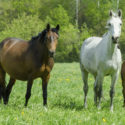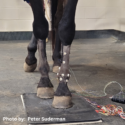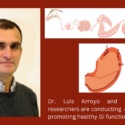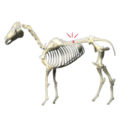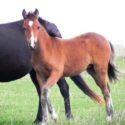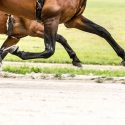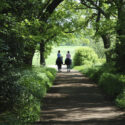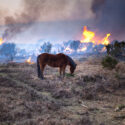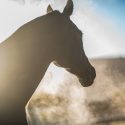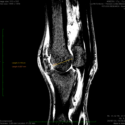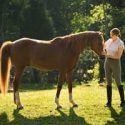equine research
Researching Infertility in Mares due to Endometritis
It is not uncommon for mares to have trouble getting pregnant because their uterus remains too inflamed after breeding. This condition is referred to as persistent breeding-induced endometritis (PBIE). Ontario Veterinary College researcher, Dr. Tracey Chenier is working to find out what causes this inflammation and how to treat it. “Horse owners and breeders often…
Ontario Veterinary College & University of Toronto Researchers Use Electroarthrography to Predict Cartilage Quality
Researchers from the Ontario Veterinary College (OVC) and University of Toronto are developing a novel method to measure the quality of cartilage in horses using electroarthrography (EAG). EAG is a non-invasive technique that uses electrodes attached to the skin around a joint to detect electrical signals produced by the cartilage when it is loaded. Dr.…
A Stable Gut: The Key to a Healthy Equine
Equine Guelph 2024 Research Annual Volume 21 – cover story by: Jackie Bellamy-Zions Gastrointestinal issues (GI) are the number one cause of morbidity in horses other than old age. An unhealthy digestive system can cause poor performance, pain, discomfort, diarrhea, and a whole host of issues that can sideline your horse. It’s no wonder researchers…
A New Approach for Treating Kissing Spine
Overriding Spinous Process, otherwise known as Kissing Spine can cause back pain and poor performance, especially when two or more vertebrae touch or overlap. Assistant Professor Dr. Nathalie Cote in the department of Large Animal Surgery at Ontario Veterinary College recently presented a new less invasive surgical approach to treat this issue that is showing…
Infographic Distills Research Investigating a Parasite that may be Involved in Equine Abortions
A study has uncovered that exposure to Neospora parasites is widespread among Ontario broodmares and may play a role in Equine Abortions. Dr. Chenier, MSc student Olivia Johns and epidemiologist Dr. David Pearl at the Ontario Veterinary College have collected samples from Ontario breeding farms to find seroprevalence is close to 30%. Risk factors identified…
A New Look at Lameness
Prevention is the ideal when it comes to lameness but practically everyone who has owned horses has dealt with a lay-up due to an unforeseen injury at some point. The following article will provide tools to sharpen your eye for detecting lameness, review prevention tips and discuss the importance of early intervention. It will also…
20 Years of Supporting the Global Equine Community
By: Anya Barradas This summer, Equine Guelph celebrates its 20th anniversary. The award-winning centre at the University of Guelph is dedicated to improving the health and welfare of horses through education and research. “Over the years, our centre has become a model for online equine education programs and a hub for horse professionals from around…
Air Quality and Air Pollution’s Impact on Your Horse’s Lungs
Story by: Dr. Janet Beeler-Marfisi There’s nothing like hearing a horse cough to set people scurrying around the barn to identify the culprit. After all, that cough could mean choke, or a respiratory virus has found its way into the barn. It could also indicate equine asthma. Yes, even those “everyday coughs” that we sometimes…
Screening for biomarkers & indicators of intestinal health among equine microbiota
No one will argue that prevention is better than cure and early intervention is certainly preferable to watching an equine partner go from not feeling 100% to being completely sidelined. Ontario Veterinary College researcher, Dr. Luis Arroyo is embarking on a very interesting collaborative study that may result in the ability to detect the first…
Equine Asthma and Macrophage Responses
What happens if the quarterback of the immune system goes rogue? In a study set to begin in June 2023, Ontario Veterinary College researcher, Dr. Janet Beeler-Marfisi, will be looking at macrophage responses to the agents that cause asthma in horses. While studies on equine asthma have been ongoing for over 40 years, we still…
Strong Support for Future Use of Stem Cells to Treat Equine Osteoarthritis
First published in Equine Guelph’s 20th Research Annual – January 11, 2023 Two studies led by Dr. Judith Koenig and her team at the Ontario Veterinary College have shown equine pooled cryopreserved umbilical cord blood, (eCB) MSC, to be safe and effective in treating joint pain and inflammation. Both studies received funding from Equine Guelph.…
Can Ponies Distinguish Human Facial Expressions?
Most humans are good at giving someone a wide berth if they approach with a furrowed brow but how good are horses at interpreting our expressions? Dr. Katrina Merkies, researcher and associate professor at the University of Guelph and her team found out in a study involving 20 lesson ponies and some talented actors. There…


